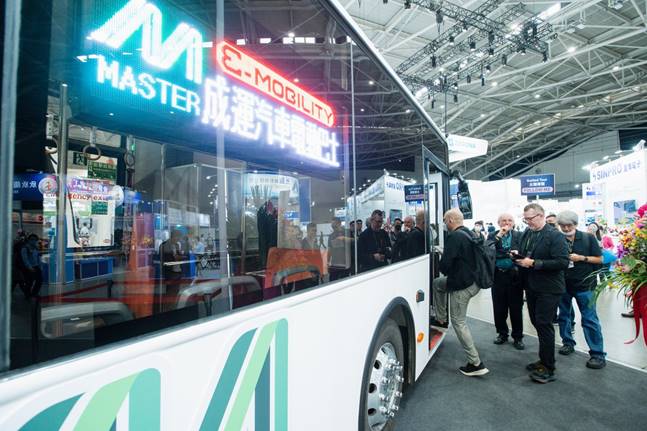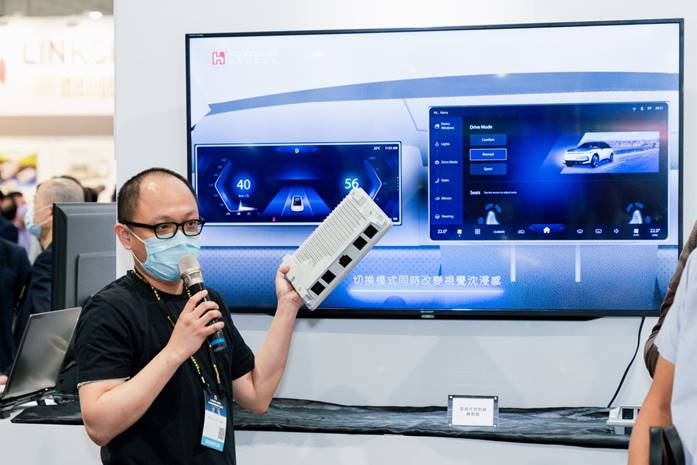|
In order to attract foreign buyers and investors, Taiwan Ministry of Economic Affairs (MOEA) has released the “Key Innovative Industries in Taiwan: New Generation Automobiles” guidebook last November, introducing the industry policy, current status, investment opportunities and incentives in details.

AMPA 2023, photo courtesy of TAITRA
Government Policy
Taiwan keeps pace with other countries around the globe in moving towards "net-zero emissions by 2050", and actively develops strategies related to electric vehicles. According to "A Comprehensive Analysis of Taiwan's 2050 Net-Zero Emission Path and Strategies" announced by the Taiwan National Development Council in March 2022, Taiwan plans to develop net-zero technology in five major areas, including (1) sustainable and forward-looking energy, (2) low-carbon and carbon reduction, (3) negative carbon, (4) recycling, (5) humanities and social sciences. Among the above technology areas, the sustainable and forward-looking energy area covers hydrogen energy applications, and the low-carbon area includes low-carbon processing and green transportation. At the same time, Taiwan’s transportation related departments also plan to strengthen the promotion of electric vehicles and set the goals "fully electrifying urban buses by 2030" and "reaching 100% electric vehicle and motorcycle sales ratio by 2040."
In order to achieve the above goals, MOEA has formulated three major promotion strategies for the electrification of transportation vehicles, including (1) subsidizing local production, using complete vehicle market to drive the component market, (2) subsidizing the development of key components, striving to enter the international supply chain, and (3) driving the domestic demand market for electric vehicles. In addition, "R&D Subsidy Program for Self-development of Key Components for Smart Electric Vehicles" has been launched since 2022, assisting key system and component manufacturers to transform and upgrade to Tier 1 suppliers, to speed up the progress of achieving the goal of 100% vehicle electrification.
Advantages for Taiwan’s New Generation Automobiles
There are numerous advantages for Taiwan’s new generation automobile industry, such as Taiwan encompasses a complete automotive industry supply chain, suitable testing environment for self-driving vehicle, and extensive experiences with information security technologies.
● Best R & D and testing facilities for next-generation vehicle automobile
Taiwan is densely populated and the road traffic is a complex mix of various forms of mobility. With a population accustomed to the use of ICT products in everyday life, Taiwan is also well-suited to become a demonstration site for the development of next-generation automobiles. In addition, the promulgation of the "Unmanned Vehicles Technology Innovative Experimentation Act" has created conditions that are even more conducive to the creation of autonomous vehicle test environments. This will make it easier for foreign firms to come to Taiwan to engage in product development and testing.
The US-China trade war is still heating up, and the US government is extremely sensitive about cybersecurity issues. Taiwan, which is strong in cybersecurity technologies and very experienced in defending against cyber attacks, is very suitable as a partner in the development of next-generation automobiles and testing sites.

AMPA 2023, photo courtesy of TAITRA
● Link up with ICT industry and win business opportunities for next-generation automobiles
A very wide swath of industry is involved in next-generation automobiles. For both electric vehicles and autonomous vehicles, there are new types of technology where breakthroughs are still needed. The ICT industry of Taiwan boasts world-class R&D capability and manufacturing expertise. Its many years of experiences in the automotive electronics industry have created a variety of applications for vehicle safety, mobility assistance, communications multimedia, and automotive IC. It can serve as a partner for international automobile manufacturers for the development of next-generation vehicles.
● Taiwan's complete vehicle and component manufacturing capabilities provides international car makers with full range production services
Auto makers in Taiwan are already capable of independent manufacturing of finished electric vehicles. And beyond that, Taiwan's auto makers have relatively flexible production lines and can provide comprehensive manufacturing services for special auto models that are produced in small batches. As such, they could be good partners for big-name international auto makers during the pilot production phase.
Taiwanese auto makers are high-level producers of auto components, and have strong technologies for the production of EV lithium batteries, drive motors, reduction gears, power storage systems, power control modules, power control systems, and telematics. In the future, as the technologies needed for new generation automobiles continue to be developed, Taiwanese makers of components will be able to rely on their superior R&D capabilities to continue providing products to big-name international auto makers.
Due to the impact of the pandemic, the dispersed distribution of production bases will become a predominant trend moving forward. In the future, Taiwan could serve as one of various regional supply centers for big-name international auto makers. Foreign firms can make good use of the existing foundation that's been laid by Taiwanese ICT firms and makers of auto components. They can also diversify their supply chain risks by setting up a Taiwan-centered regional production network that serves as a backup production base or supply source for important components.
Focus of Policy
● Autonomous vehicles
Taiwan government is using advanced driver assistance systems (ADAS) as the basis for legislative amendments designed to improve traffic safety.
● Self-driving vehicles
Legal basis: Taiwan's national legislature in 2018 passed the "Unmanned Vehicles Technology Innovative Experimentation Act." Drawing upon the "regulatory sandbox" spirit, this act provides a statutory basis for loosely regulated experimental efforts to develop new types of unmanned vehicle technologies.
Testing sites: They include the Taiwan CAR Lab in Shalun, Tainan for testing vehicles such as mid-sized buses or smaller. Hutoushan Innovation Hub in Taoyuan City uses the Internet of Vehicles (IoV) & Smart Driving Center and Information Security IoT Center to test autonomous vehicles under a wide variety of simulated environments.
Tax Incentives
● The profit-seeking enterprise income tax rate is 20%.
● Up to 15% of the company's R&D expenditures may be deducted from its profit-seeking enterprise income tax for current year; or up to 10% of such expenditures may be credited over three years against the profit-seeking enterprise income tax payable by the company.
● Royalty payments to foreign companies for imported new production technologies or products that use patents, copyrights, or other special rights owned by foreign companies is, with the approval of the Industrial Development Administration, MOEA, exempt from the corporate income tax.
● Imported machinery which local manufacturers cannot produce are eligible for duty-free treatment.
● Investment in smart machinery/5G: For investments of no less than NT$1 million and no more than NT$1 billion, either "5% of investment spending deducted from profit-seeking enterprise income tax (current FY)" or "3% of investment spending deducted from profit-seeking enterprise income tax, if total spending spread over three years" may be selected, but the total amount deducted may not exceed 30% of corporate income tax that year. The applicable period is expected to be extended to December 31, 2024.
● A company employee who has obtained stock compensation worth a combined total of less than NT$5 million and continuously held the stock while remaining in the company's employ for at least two years may choose to be taxed on the market price of the stock at either the time the stock was obtained or the time the stock is sold, whichever is lower.
● Foreign special professionals who meet criteria are eligible for a 50% deduction of total income tax for amounts exceeding NT$3 million.
● Companies that set up operations in export processing zones, science industrial parks, or free trade ports are eligible for exemptions on import duties, commodity tax, and business tax for the import of machinery and equipment, ingredients, fuel, materials, and semi-finished products for their own use.
● Companies that use undistributed earnings to engage in substantive investments may exclude the amount when calculating their profit-seeking enterprise income tax.
| Author: |
Anita Li |
| Current Post: |
Chief Editor, NAIPnews |
| Education: |
MA Journalism, China Culture University (Taiwan) |
| Experience: |
Chief Editor, Solid State Technology -Taiwan
Chief Editor, CompuTrade International
Overseas Correspondent, Dempa Shimbun |
|
|
|
| Facebook |
|
Follow the IP Observer on our FB Page |
|
|
|
|
|
|

